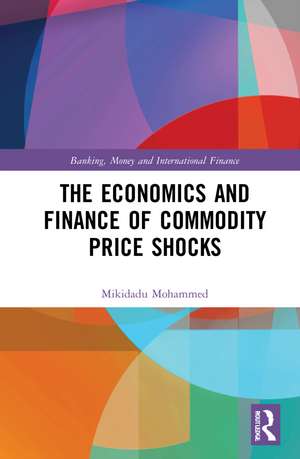The Economics and Finance of Commodity Price Shocks: Banking, Money and International Finance
Autor Mikidadu Mohammeden Limba Engleză Hardback – 26 noi 2021
Three main objectives motivated the writing of this book. First, to provide a variety of modelling frameworks for documenting the frequency and intensity of commodity price shocks. Second, to evaluate existing approaches used for forecasting large movements in future commodity prices. Third, to cover a wide range and aspects of global commodities including currencies, rare–hard–lustrous transition metals, agricultural commodities, energy, and health pandemics. Some attempts have already been made towards modelling commodity price shocks. However, most tend to narrowly focus on a subset of commodity markets, i.e., agricultural commodities market and/or the energy market. In this book, the author moves the needle forward by operationalizing different models, which allow researchers to identify the underlying causes and effects of commodity price shocks. Readers also learn about different commodity price forecasting models.
The author presents the topics to readers assuming less prior or specialist knowledge. Thus, the book is accessible to industry analysts, researchers, undergraduate and graduate students in economics and financial economics, academic and professional economists, investors, and financial professionals working in different sectors of the commodity markets. Another advantage of the book’s approach is that readers are not only exposed to several innovative modelling techniques to add to their modelling toolbox but are also exposed to diverse empirical applications of the techniques presented.
Din seria Banking, Money and International Finance
-
 Preț: 312.97 lei
Preț: 312.97 lei -
 Preț: 280.22 lei
Preț: 280.22 lei -
 Preț: 313.57 lei
Preț: 313.57 lei -
 Preț: 389.38 lei
Preț: 389.38 lei - 18%
 Preț: 1000.27 lei
Preț: 1000.27 lei - 20%
 Preț: 347.76 lei
Preț: 347.76 lei -
 Preț: 493.37 lei
Preț: 493.37 lei - 17%
 Preț: 271.20 lei
Preț: 271.20 lei - 18%
 Preț: 998.40 lei
Preț: 998.40 lei - 26%
 Preț: 764.20 lei
Preț: 764.20 lei - 18%
 Preț: 908.65 lei
Preț: 908.65 lei - 12%
 Preț: 298.61 lei
Preț: 298.61 lei -
 Preț: 383.17 lei
Preț: 383.17 lei -
 Preț: 391.99 lei
Preț: 391.99 lei - 18%
 Preț: 904.93 lei
Preț: 904.93 lei - 18%
 Preț: 1109.18 lei
Preț: 1109.18 lei - 18%
 Preț: 1004.24 lei
Preț: 1004.24 lei -
 Preț: 387.83 lei
Preț: 387.83 lei -
 Preț: 389.38 lei
Preț: 389.38 lei - 12%
 Preț: 312.24 lei
Preț: 312.24 lei - 16%
 Preț: 275.07 lei
Preț: 275.07 lei - 17%
 Preț: 259.98 lei
Preț: 259.98 lei - 17%
 Preț: 272.43 lei
Preț: 272.43 lei - 26%
 Preț: 763.39 lei
Preț: 763.39 lei -
 Preț: 430.00 lei
Preț: 430.00 lei - 20%
 Preț: 880.34 lei
Preț: 880.34 lei - 26%
 Preț: 762.24 lei
Preț: 762.24 lei - 18%
 Preț: 886.46 lei
Preț: 886.46 lei - 19%
 Preț: 271.43 lei
Preț: 271.43 lei - 18%
 Preț: 1001.87 lei
Preț: 1001.87 lei - 25%
 Preț: 654.89 lei
Preț: 654.89 lei - 18%
 Preț: 903.04 lei
Preț: 903.04 lei - 18%
 Preț: 1005.04 lei
Preț: 1005.04 lei - 31%
 Preț: 767.07 lei
Preț: 767.07 lei - 31%
 Preț: 764.20 lei
Preț: 764.20 lei
Preț: 1001.24 lei
Preț vechi: 1221.02 lei
-18% Nou
Puncte Express: 1502
Preț estimativ în valută:
191.58€ • 200.03$ • 158.56£
191.58€ • 200.03$ • 158.56£
Carte tipărită la comandă
Livrare economică 05-19 aprilie
Preluare comenzi: 021 569.72.76
Specificații
ISBN-13: 9781032033693
ISBN-10: 103203369X
Pagini: 214
Ilustrații: 2 Line drawings, color; 280 Line drawings, black and white; 12 Tables, black and white; 2 Illustrations, color; 280 Illustrations, black and white
Dimensiuni: 156 x 234 x 14 mm
Greutate: 0.48 kg
Ediția:1
Editura: Taylor & Francis
Colecția Routledge
Seria Banking, Money and International Finance
Locul publicării:Oxford, United Kingdom
ISBN-10: 103203369X
Pagini: 214
Ilustrații: 2 Line drawings, color; 280 Line drawings, black and white; 12 Tables, black and white; 2 Illustrations, color; 280 Illustrations, black and white
Dimensiuni: 156 x 234 x 14 mm
Greutate: 0.48 kg
Ediția:1
Editura: Taylor & Francis
Colecția Routledge
Seria Banking, Money and International Finance
Locul publicării:Oxford, United Kingdom
Public țintă
PostgraduateCuprins
1. Introduction 2. History and Theories of Commodity Price Shocks 3. Modelling Commodity Price Shocks 4. Commodity Price Shocks Identification 5. Effects of Commodity Price Shocks 6. Applications 7. Commodity Price Forecasting 8. Risks Associated with Commodity Price Forecasts 9. Conclusion
Notă biografică
Mikidadu Mohammed, Ph.D., is Assistant Professor of Economics at Austin College. His research focuses on the underlying causes of energy price shocks, their macroeconomic effects, and appropriate policy responses. Some of his recent work has been on the causal relationship between oil production and economic growth and development. He has also conducted research on the oil price–current account nexus for advanced and developing countries where he examined whether a country’s level of financial development matters in explaining the sensitivity of current account balance to oil price fluctuations. Dr. Mohammed has published in several highly ranked economic journals and has been invited to give talks at many institutions and conferences. He is also the Co-Director of the Austin College–Dallas Federal Reserve Bank Economics Scholars Program.
Descriere
This book provides insights into the theoretical, conceptual, and empirical modelling of the underlying causes of global commodity price shocks. Readers also learn about different commodity price forecasting models and are exposed to diverse empirical applications of the techniques presented.
